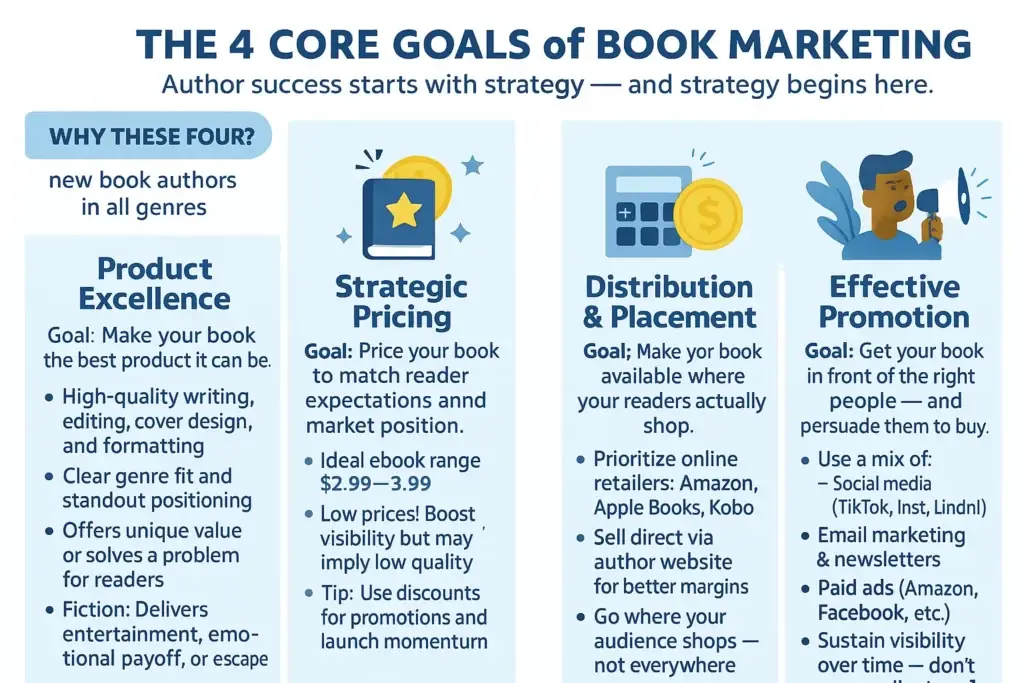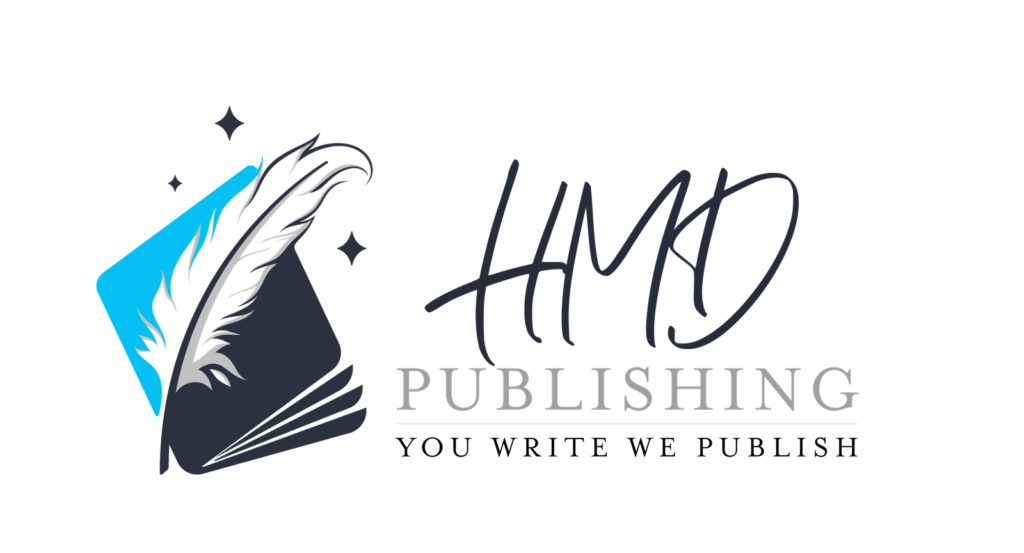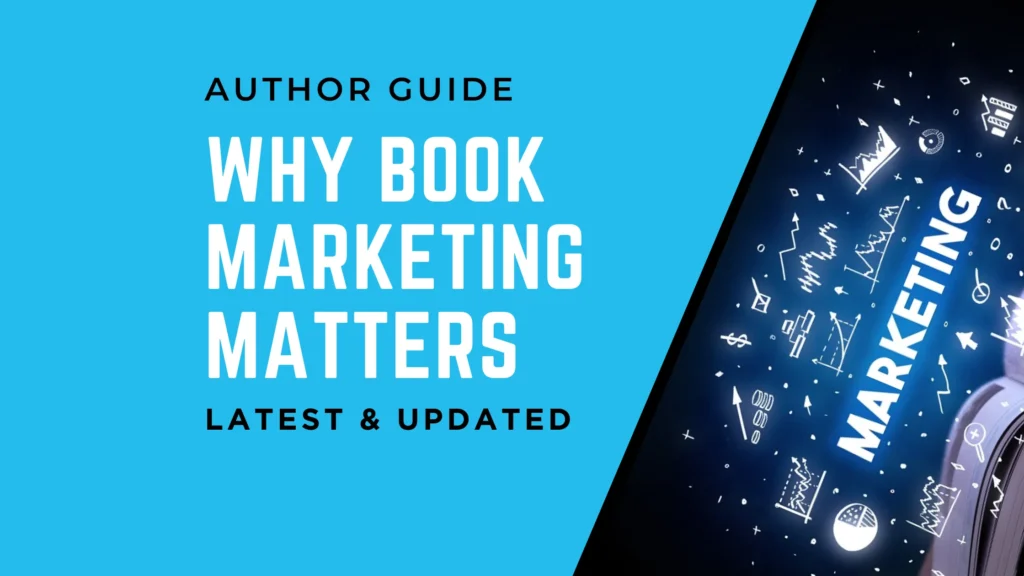Every day, hundreds of new books hit the shelves in the U.S. alone. Over 4 million are published each year. That’s not just noise, it’s a wall you have to break through. Writing a book is hard enough, but getting it noticed is even harder. That’s the real test. In this crowded space, even the most brilliant manuscript won’t go far without strategic marketing behind it. This blog unpacks why book marketing matters just as much as the book writing itself, and gives you practical, relevant tactics to get your book into the hands of the readers who need it most.
What does book marketing mean?
Book marketing can be defined as the strategic process of promoting, selling, and increasing awareness of your book through various strategies and techniques. At its core, book marketing consists of all the strategies and activities involved in promoting and selling books to potential readers.. It goes beyond the simple act of announcing your book’s existence. It’s all about creating a comprehensive approach to connect your work with the right audience at the right time. Book marketing differs from general product marketing in several key ways. Books need to show readers that they are worthy enough for their time. Unlike other products, books compete not just with other books, but with all forms of entertainment and information consumption. This unique challenge requires authors to demonstrate value beyond just the purchase price; rather, they must prove their book deserves a reader’s most precious resource, that is, time.
What is a book marketing plan?
A book marketing plan is a comprehensive, strategic document that outlines how you will promote your book to reach your target audience. Think of it as your roadmap to success as an author. It is a blueprint that guides all your promotional activities and keeps you focused on what matters most for your specific book and goals.
An effective book marketing plan includes several essential components. First, it begins with market research and audience identification. You need to understand who your ideal readers are, what they’re looking for, and where they spend their time. This goes beyond basic demographics to include psychographics – understanding your readers’ motivations, pain points, and reading preferences.
Competition analysis forms another crucial element. Understanding what similar books are doing successfully and where they’re falling short helps you position your book effectively in the marketplace. This includes analyzing pricing strategies, marketing channels, and messaging approaches used by comparable titles.
Your marketing plan should outline specific strategies and tactics across multiple channels. This might include social media marketing, email campaigns, book trailer creation, influencer partnerships, media outreach, and advertising strategies. The key is selecting tactics that align with your audience’s preferences and your available resources.
Timeline and budget considerations are equally important. Your plan should map out when different marketing activities will occur, ideally starting well before your book launch and continuing long after publication. Budget allocation ensures you can execute your chosen strategies without overspending.
Finally, an effective book marketing plan includes metrics for measuring success. This allows you to evaluate which tactics are working and which need adjustment, making your future marketing efforts more efficient and effective.
Why Book Marketing Is Essential for Authors in 2025
Marketing has become crucial for authors in today’s publishing environment, regardless of whether they’re self-published or traditionally published. The statistics are sobering: 85 per cent of all books published by traditional publishers receive less than $2,000 in marketing support. This means that even traditionally published authors must take an active role in promoting their work.
The primary reason marketing is essential is visibility and awareness. Without marketing, your book may remain hidden in the vast sea of publications. Even the most well-written and captivating books can go unnoticed on bookstore shelves or online platforms without proper marketing efforts. In a world where readers are overwhelmed by choice, marketing helps your book cut through the noise and reach its intended audience.
How to Write a Book with No Experience?
Building sales and revenue represents another critical benefit of book marketing. Effective marketing directly impacts book sales by creating interest and demand among readers. When books reach larger audiences through marketing efforts, they’re more likely to generate significant sales, leading to better royalties and greater financial success for authors.
Marketing also enables author brand building. Book marketing isn’t just about selling a single title – it’s about establishing yourself as a recognisable author whose future works readers will actively seek out. A strong author brand creates lasting relationships with readers and can lead to speaking engagements, partnerships, and other revenue opportunities beyond book sales.
Reader engagement and community building form another essential benefit. Marketing provides avenues for authors to connect with their readers on a personal level through social media, author websites, and book events. This engagement creates loyal fans who not only buy your books but also recommend them to others, generating valuable word-of-mouth marketing.
Can self-publishing be profitable in 2025?
Marketing establishes credibility and authority in your field. A well-executed marketing strategy can position you as an expert in your genre or subject area. Media coverage, positive reviews, and endorsements garnered through marketing efforts contribute significantly to your reputation as an author.
Finally, marketing creates networking opportunities. Engaging in book marketing often means connecting with fellow authors, publishers, and influencers in the literary world. These connections can lead to collaborative opportunities, valuable advice, and a support system that helps navigate the challenges of the publishing industry.
What are the four marketing goals?

When developing a book marketing strategy, authors should focus on four fundamental marketing goals that align with the traditional 4 Ps of marketing, which are: Product, Price, Place, and Promotion. These four pillars provide a comprehensive framework for creating effective marketing campaigns that drive results.
Product Excellence
The first marketing goal focuses on optimizing your book as a product. This means ensuring your book meets the highest quality standards in every aspect, from writing and editing to cover design and interior formatting. Quality matters because readers evaluate books based on multiple factors: cover appeal, genre fit, author credibility, writing style, and overall production value.
Your book must also solve a specific problem for readers. For fiction, this might mean providing the perfect escape or entertainment in a beloved genre. For non-fiction, it could involve making something easier, better, or faster for your audience, or inspiring them to achieve their goals. The key is differentiating your book from competitors by offering unique value through your perspective, expertise, or storytelling approach.
Complete Guide to Unforgettable Book Cover Deisgns
Strategic Pricing
The second goal involves setting the optimal price point for your book. Pricing is more than just covering production costs plus profit; it’s about positioning your book in the market and appealing to your target audience. Research indicates that the most effective price range for ebooks is typically between $2.99 and $3.99.
Pricing strategy affects reader perception and purchasing behaviour. High prices can be associated with prestige and quality, attracting certain readers while deterring others. Conversely, very low prices might signal poor quality to some buyers, though they can be effective for gaining initial readership or during promotional periods.
Distribution and Placement
The third marketing goal focuses on ensuring your book is available where your target readers shop. While every author dreams of bookstore placement, the reality is that shelf space is limited, but online “shelf space” is virtually unlimited. This means focusing on digital distribution channels and online retailers where the right audience can discover your book.
Consider where your ideal readers are most likely to purchase books. This might include major online retailers, genre-specific bookstores, or direct sales through your author website. The key is making your book easily accessible to your target audience through their preferred purchasing channels.
Effective Promotion
The fourth goal encompasses all the activities you undertake to make your target audience aware of your book and persuade them to purchase it. This includes advertising, public relations, social media marketing, email campaigns, book launches, media appearances, and content marketing.
Effective promotion requires understanding your audience’s preferences and meeting them where they are. Different genres and audiences respond better to different promotional strategies. For example, young adult fiction might thrive on social media platforms like TikTok and Instagram, while business books might perform better with LinkedIn marketing and professional speaking engagements.
Successful promotion also involves timing and consistency. Rather than sporadic promotional bursts, effective book marketing requires sustained effort over time, building relationships with readers and maintaining visibility in the marketplace long after your initial launch.
By focusing on these four marketing goals, product excellence, strategic pricing, optimal placement, and effective promotion, authors can create comprehensive marketing strategies that maximize their book’s potential for success. Each goal supports the others, creating a synergistic effect that amplifies your marketing efforts and increases your chances of reaching and engaging your target audience effectively.
The key to success lies in understanding that these four goals work together as an integrated system. A great book (product) needs the right price point, proper distribution, and effective promotion to reach its full potential. By addressing each of these areas strategically, authors can create marketing campaigns that not only sell books but also build lasting relationships with readers and establish themselves as successful authors in their chosen genres.




